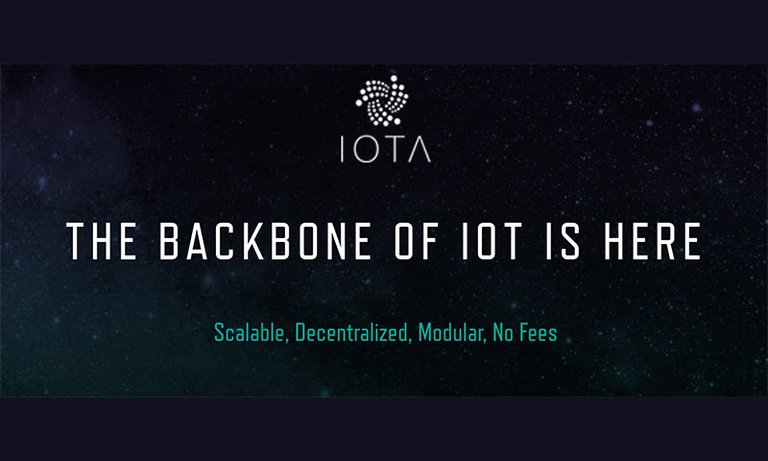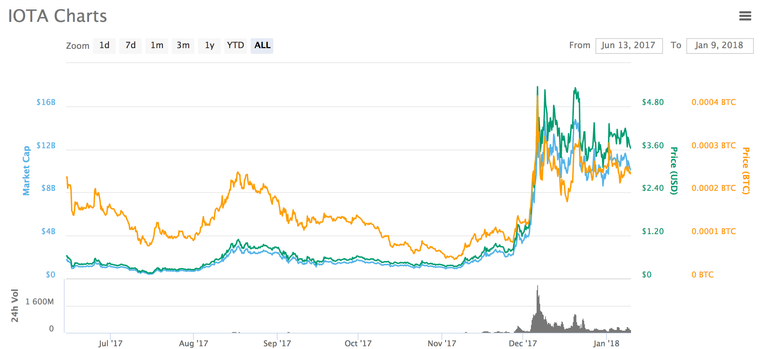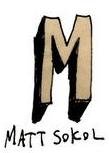IOTA is a Directed Acrylic Graph (DAG) based cryptocurrency that enables fast, high frequency, no fee transactions. This is designed to facilitate new and improved implementations of Internet of Things technologies.
source

In IOTA’s DAG-based system, transactions are confirmed as part of a slowly evolving “graph” of transactions. Basically each transaction connects back to the genesis address where all tokens originate from - but they do in an asynchronous way where not every node needs to see every transaction. Also, there are no blocks.
Instead of blocks, you can think of a DAG as like a branching tree of information.
The claimed benefit of the DAG is to have a more scalable system that does not need any fees for transactions.
No Fee Transactions
IOTA claims to be the world’s first no fee cryptocurrency. Given what I know about Steem, I was skeptical of this claim.
Here’s where they say it (from the website):

However, their Wikipedia page’s “history” data shows them not exiting the beta phase until 2016:


Altcoin Spekulant says that the entire token supply was sold in a 2015 ICO, but does not source this information:

The same article says that around 14% of tokens remained unclaimed after the ICO and therefore ended up in the hands of the developers. That’s a pretty low centralization of tokens, much lower than many of the other popular blockchains as we’ve seen throughout this series.
It appears that at the earliest, IOTA’s no fee transactions may have been possible in late 2015. If so, it could have been one of the first no fee cryptocurrencies - but by now, blockchain technology has evolved to make this a more common feature.
No fee transactions are definitely necessary for micro-transactions which make up IOTA’s main use case.
An Example of IOTA in Action
I am thinking to try and come up with an example of how somebody could use IOTA in the real world. This process is a good way to assess the real potential usability of a coin.
Here’s an idea:
The whole point of IOTA is that it enables objects to communicate with each other and to react to cryptocurrency payments via smart contracts. It’s the same Internet of Things idea that has been around for a long time now.
When I lived in Brooklyn, I would sometimes need to rent out rehearsal spaces by the hour. This would cost about $20 per hour to get a soundproof room with some drums and guitar amps in it.
The way it worked in the old days, you paid regular dollars at the start before you started to rehearse. But what about an IOTA-powered, AirBnB style rehearsal space rental system?
Imagine that I pay a few hundred bucks a month to rent out a noise-friendly room and equip it with drums and amps. Then I put an electronic lock on the door. Now I could use IOTA tokens and anybody who wants to use the space would pay the appropriate number of tokens, then use their phone to unlock the door.
As soon as the payment goes through, they would access the space. It could block people from using the service in the future if they go longer than they pay for. All of this would be automated.
After set up, it would generate enough income (in theory) to cover the cost of renting the space and then some. I’d get notifications on my phone whenever the room was being rented so I’d know not to go and try to use it. Then whenever I was in there practicing, it would show up as unavailable on the app for other people.
This app would be connected to a lot of stuff - apartments to stay at, art studios, office workspaces, rental cars and bikes and skateboards, etc, and all of these things could be provided by anybody. Just like how on eBay, anybody can sell stuff.
Similarly to eBay, there will be a range of users offering things on this app - from individuals who want to earn beer money by renting out a spare bike, to full professional operations offering thousands of items.
It’ll be great for the end consumer because we will all have affordable, competitive market rate access to anything for any amount of time.
Like one example that comes to mind is, I don’t own a Windows computer but my friends have been playing Player Unknown’s Battlegrounds. If this IOTA system was fully mature, I could walk to a computer locker downtown and rent a Windows laptop capable of playing the game.
I’d rent the computer for days at a time - unless I wanted to borrow it for a few hours during the day and then walk back to return it.
A bit further in the future, but probably within our lifetimes, these items can be delivered and picked up via self-piloting drones. Then we can rent anything at any time for as long or short as we want, and as long as our wallet has enough money in it, payments will be automatic and out of sight.
If you are generating income as well as spending - your app could automatically balance how much you need to lend out your stuff to stay at a net of $0.
This sounds crazy and futuristic and amazing - it is all of those things. It’s also completely feasible and doesn’t require any radical new technology. Everything I’m describing seems easily possible with another 5-10 years of development on blockchains/DAG and sharing apps.
It make me excited for IOTA. This is a technology that has serious potential to make the Internet of Things, and the Sharing Economy, finally real. This will reduce waste and vastly improve the efficiency of how humanity uses its resources.
The IOTA Team
excellent post introducing the core IOTA team. Rather than reiterate some of the info here, I’ll just let you go check it out over there.Steemit user @j3dy has an
Market History
Here’s the Coinmarketcap chart for IOTA:

It’s a binary price pattern, with the token sitting at one low valuation for a while (with mild gains) and then shooting up to a new, much higher and more volatile price in December 2017.
I don’t know what is coming next for this token. It’s already at an astonishing $10 Billion market cap right now, but I see good things for the long term prospects of the protocol. It could become a globally used service that generates huge value.
It seems like it may be worthing keeping an eye on IOTA.
Final Thoughts
I am excited about IOTA, in fact this is one of the tokens that has gotten me the most pumped from this series so far. While the features here are not all that different from what the Steem token and other cryptocurrencies allow for, the focus on Internet Of Things is exciting to me.
I believe that this technology could radically improve our lives over the next decade.
Most likely, this will be one of a suite of tokens (along with Steem and others) that finally facilitate micro and nano-transactions as a regular part of the internet. It’ll be affordable for consumers and lucrative for businesses.
Best of all, this use case will be accessible to anybody with at least one nice thing. Hopefully even lower income earners will be able to benefit from this network - and that’s something to pay attention to as we move forward.
What do you think about IOTA?


IOTA looks amazing. Definitely worth further investigation! This series has been great. Well worth a read everytime.
Lol I've been missing you bro, glad to see you back!
IOTA is amazing in every aspect, too bad the two biggest trading sites (Bittrex, Poloniex) don't support it. :/
Thanks @katamori good to be back and to get to the last batch of these investigations :-)
thanks for the summary! I can highly recommend investing in IOTA! I think its very undervalued due to the fact that IOTA partnered with Bosch! I think that many people dont know how big and investigative the Bosch company really is! They even have an AI centre in Germany! For me top 3 of cryptochart!
Matt, did you research MIT scientists vs. IOTA devs on IOTA security issues? Maybe you should...
Nope, what did they say?
There are problems :-) https://www.media.mit.edu/posts/iota-response/
and here are your answers ;)
https://blog.iota.org/official-iota-foundation-response-to-the-digital-currency-initiative-at-the-mit-media-lab-part-1-72434583a2
IOTA sounds amazing in theory but I lost trust in them after they sabotaged their open source code.
Can you elaborate?
Someone found a flaw in their open source code and when they contacted the IOTA team about it, the team said it was no mistake and that they use a secret line of code (this one not open source) to correct it.
This goes against the whole reason people use open source code. People make their code open source so that others can use it, improve upon it, and apply it to different things. But IOTA doesn't want that apparently...
Here is an article that talks about it from an Ethereum dev
^^^
Great post, I know next to nothing, but am drawn to IOTA, loving the idea of this technology. But having real life examples of how it could operate really help to engage. Thanks
Great content as always, thanks for sharing! One of the best real world uses for Crypto at the moment with great potential. Makes up a major part of my portfolio! cheers mate
You're welcome @lollobrown glad it helps. I think IOTA will be in my portfolio too once I'm done paying off debts.
Thanks for actually taking the time to write a review that's full of your own opinions, and well researched. I'll up vote for that all the time.
Shame most people would rather just watch a video opinion/rant these days. But ah well.
I too am a firm believer in IOTA, and recently doubled my hold in the current dip, few coins make you confident in doing that, NEO being another, just regret not buying more than 20 when it was at $38.
Yea that regret will always be there, but at least you got in at a good price. Thanks for taking the time to read the review, that is greatly appreciated. Cheers Steve